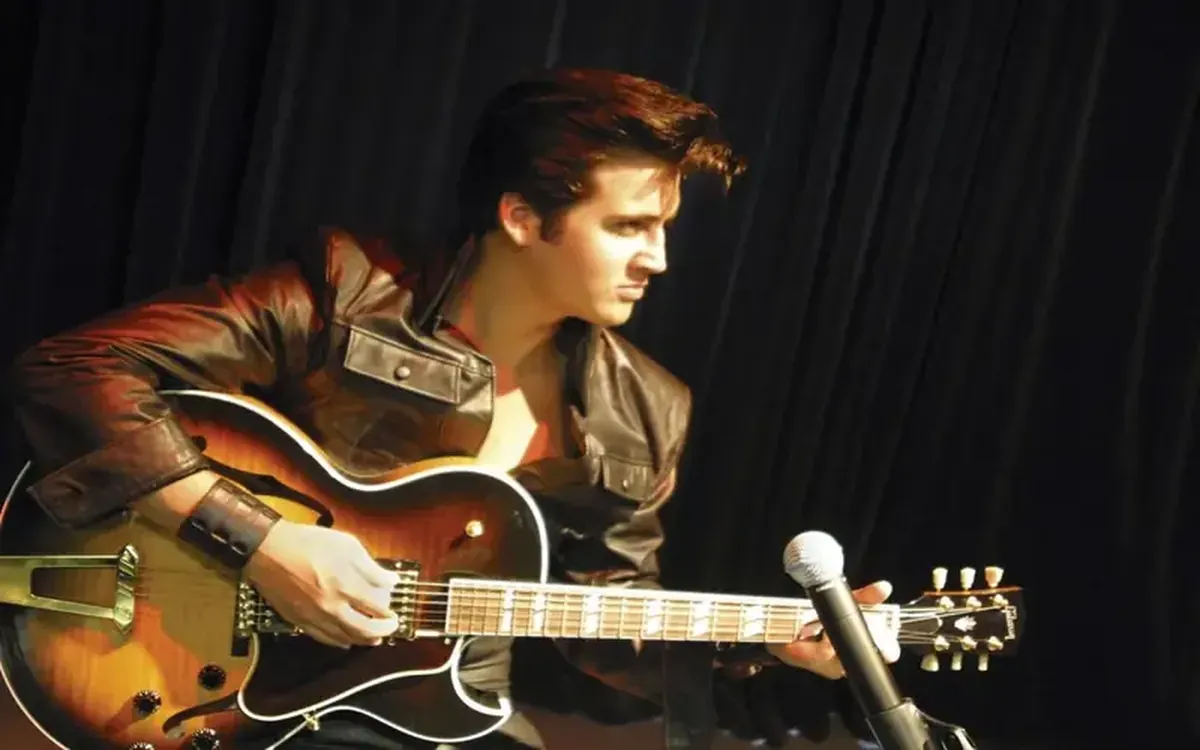
“God in a Pink Suit” is a unique phenomenon of the American stage. Elvis Presley’s rock and roll emerged as a cultural alternative filled with dancing, fun, and eroticism, becoming a sensation amid the stifling realities of the time. In the 1950s and 60s, he expressed new societal sentiments and became a symbol of nonconformity. The essence of the “King of Rock and Roll” lay in his innate independence and defiance of rules, his rebellious spirit, and his messianic charisma. One of the most successful performers of popular music in the 20th century gifted America with his own musical aesthetic: it was in his work that the conservatism of “white” country was first blended with the sensual energy of “black” rhythm and blues. Critics dubbed this talented son of humble beginnings “the first perfect rock star in the history of music.” For many fans, their idol never died, and in 2004, Rolling Stone magazine officially confirmed this by placing Elvis Presley alongside The Beatles and Bob Dylan at the top of its list of “Immortals: The 50 Greatest Artists of All Time.”
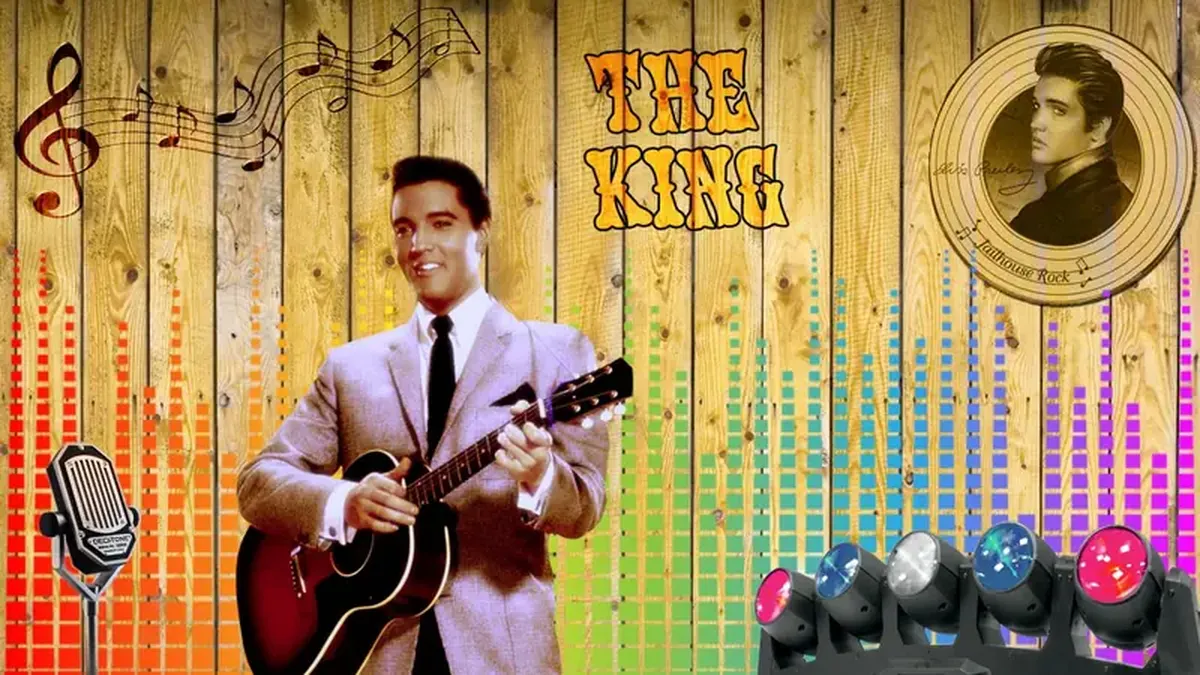
A Guitar Instead of a Bicycle
Elvis Presley was born on January 8, 1935, in Tupelo, Mississippi. His paternal ancestors hailed from Scotland and Germany, while his mother had Scottish-Irish roots. In his mother’s lineage, to whom Elvis felt a deep attachment, there were also Normans and even a Cherokee Indian. With a dominant personality, Gladys Presley, née Smith, was the head of the family, while Vernon Presley struggled for a long time with the lack of a steady income, which prevented him from providing the family with a decent standard of living. Three years after the birth of their son, the family’s difficult situation worsened when his father was imprisoned in 1938 for check forgery.
No woman in the future star’s life influenced him as much as his beloved mother. They shared a special bond, communicating in a “child’s secret language.” After losing her stillborn twin brother, Gladys took extra care to protect her only son from life’s hardships, raising him to be grateful and devoted. The boy grew up with a love for music and religion: a member of the Assemblies of God church, he sang in the church choir from a young age. For his 11th birthday, Elvis received a guitar as a gift from his parents. The first musical instrument in his life was purchased after he triumphantly sang a folk song at a fair and won a prize for his vocal victory. Plus, the guitar turned out to be cheaper than a bicycle, which they simply couldn’t afford at the time.
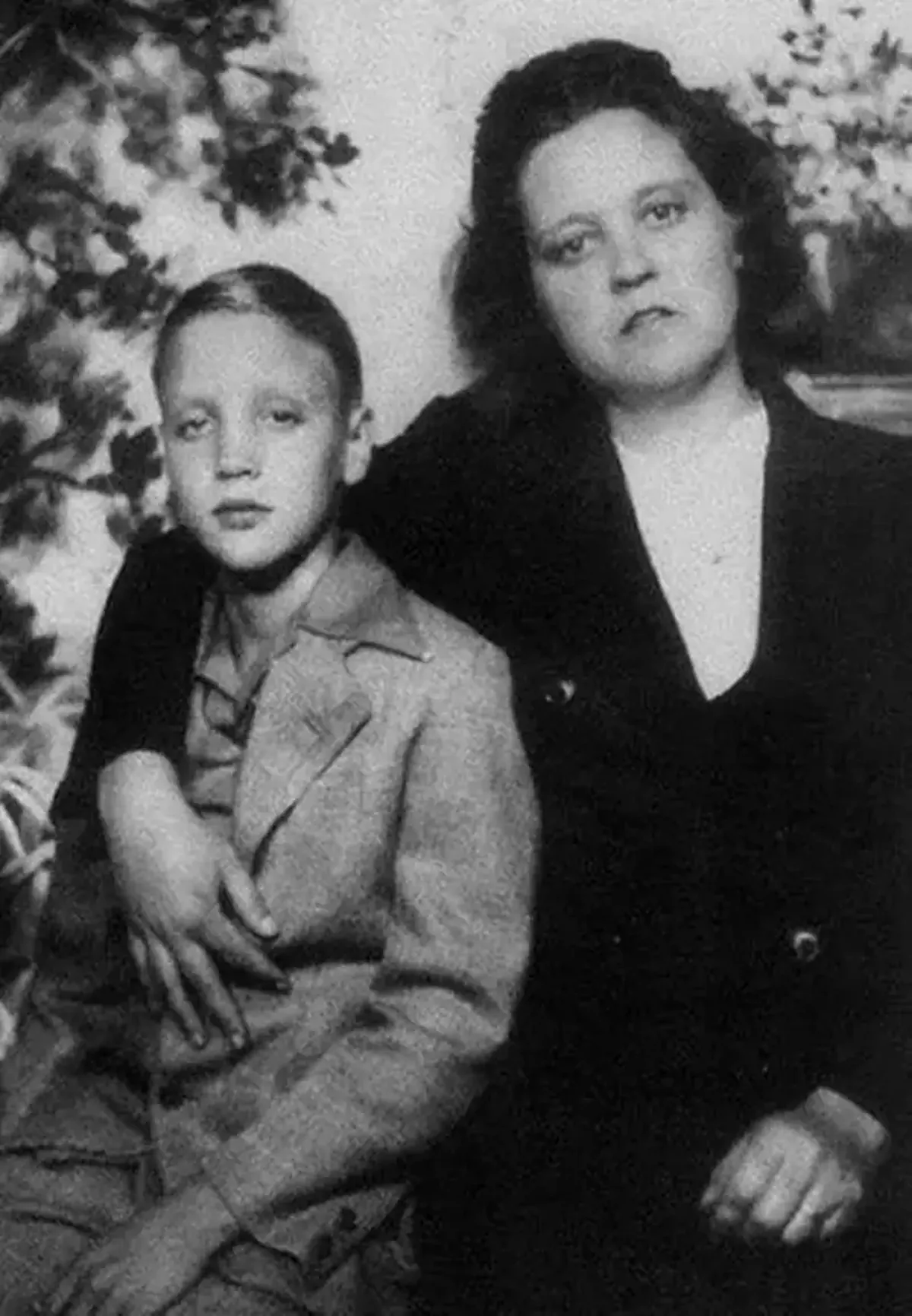
Within a year, Elvis learned the basics of guitar playing by watching his uncles and the pastor’s technique. Once he figured out how to produce beautiful sounds from the instrument, he was too shy to sing in public to those chords (he would fear the stage even at the peak of his musical career, though he would never show it behind his brash singing style).
At school, Elvis was a loner. He preferred focused playing in a corner with his guitar over school pranks: he brought the instrument to class and practiced during breaks. He played the rhythms he heard from the neighbors – at that time, the family of a truck driver (a profession Elvis inherited after reaching adulthood) lived in a low-income area for African Americans. He became more serious about music after moving to Memphis, Tennessee, where his father had better chances of finding work.
The King of Rock and Roll
Elvis Presley recorded his first two songs in 1953 as a surprise for his mother. The “experimental” record cost him $8 and was recorded at the Memphis Recording Service studio. Enthralled by the process, Elvis soon returned to the studio to lay down two new tracks. The newcomer caught the attention of the studio, and by the summer of 1954, the studio itself invited him to record as a vocalist. Although that experience wasn’t particularly successful, he later made demo recordings with musicians from a local amateur band, the Starlight Wranglers. When the studio owner played the recording on a local radio station, it was aired several times an hour. The performer, with an unusual singing style for a white person, was invited for an interview, during which they inquired about his school to assure listeners that the singer was not African American (during segregation, separate schooling was practiced for children of different skin colors).
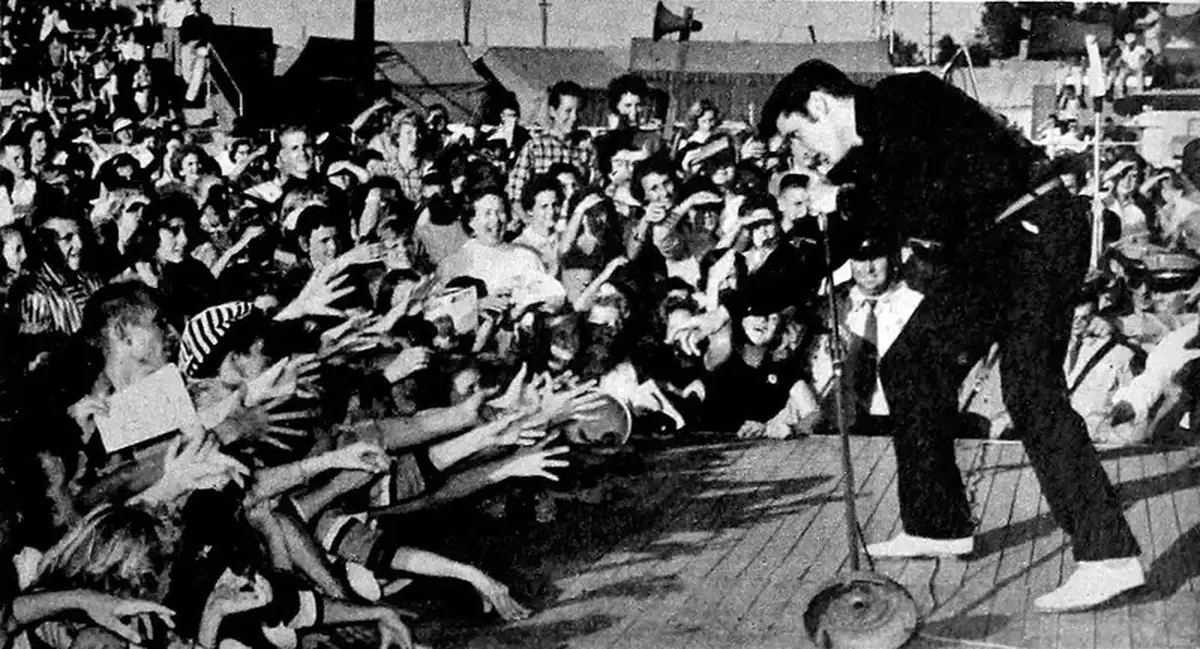
Presley began to believe in himself. Just a month earlier, he had unsuccessfully auditioned for the Songfellows quartet, and before that, he had failed a trial performance at a Memphis club. Everywhere he was told he couldn’t sing and advised to continue working as a truck driver. In just a few months, the narrative shifted from “Singing isn’t for you” to “There’s something to this.” By mid-summer 1955, Presley’s recordings had transcended provincial popularity: Billboard and Cashbox magazines named the newcomer “the most promising star in country music.” The mediation of his new partner, Tom Parker, led to a contract signed at the end of 1955, which allocated Elvis 5% of the profits from record sales.
The first records of 1956 – “Heartbreak Hotel” and the debut album “Elvis Presley” – topped the American charts, with sales exceeding a million copies. Presley became a frequent guest on national television, and by the end of the 1950s, his popularity even broke through the “Iron Curtain”: in 1957, The New York Times reported on the enthusiasm for the American singer among the youth in the USSR. Presley’s songs dominated the charts in Canada, the UK, Italy, South Africa, and Australia. After signing an exclusive contract for professional management with Tom Parker, Elvis Presley appeared on Frank Sinatra’s television show, and the American magazine Variety dubbed him “the King of Rock and Roll.”
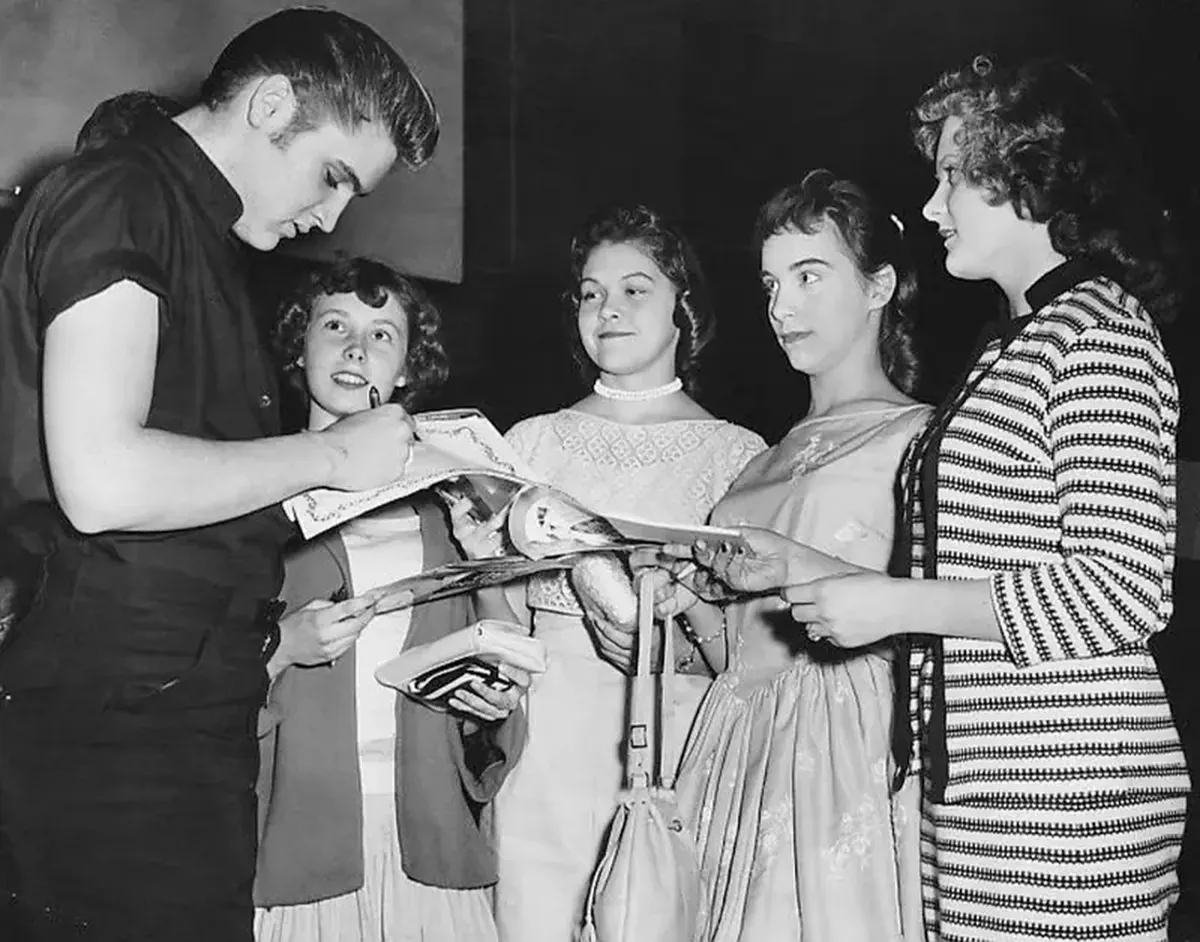
Elvis signing autographs (1956)
Army or Career
Alongside his musical success, Presley fulfilled his dream of becoming a movie actor. After his first film, “Love Me Tender,” in 1956, he starred in “Loving You” in 1957, which was based on his own biography. For the role in the first of nine films produced by Paramount Pictures’ Hal Wallis, Elvis dyed his blonde hair black and never returned to his natural color, pausing only during his military service. Presley was drafted into the army on December 20, 1957, but received a deferment due to ongoing filming. At the time of his military induction, the artist had already moved his family members into a new mansion, Graceland, in Memphis (which he purchased in 1957). That same year, Elvis gave a few concerts in Canada – those were his first and last performances abroad.
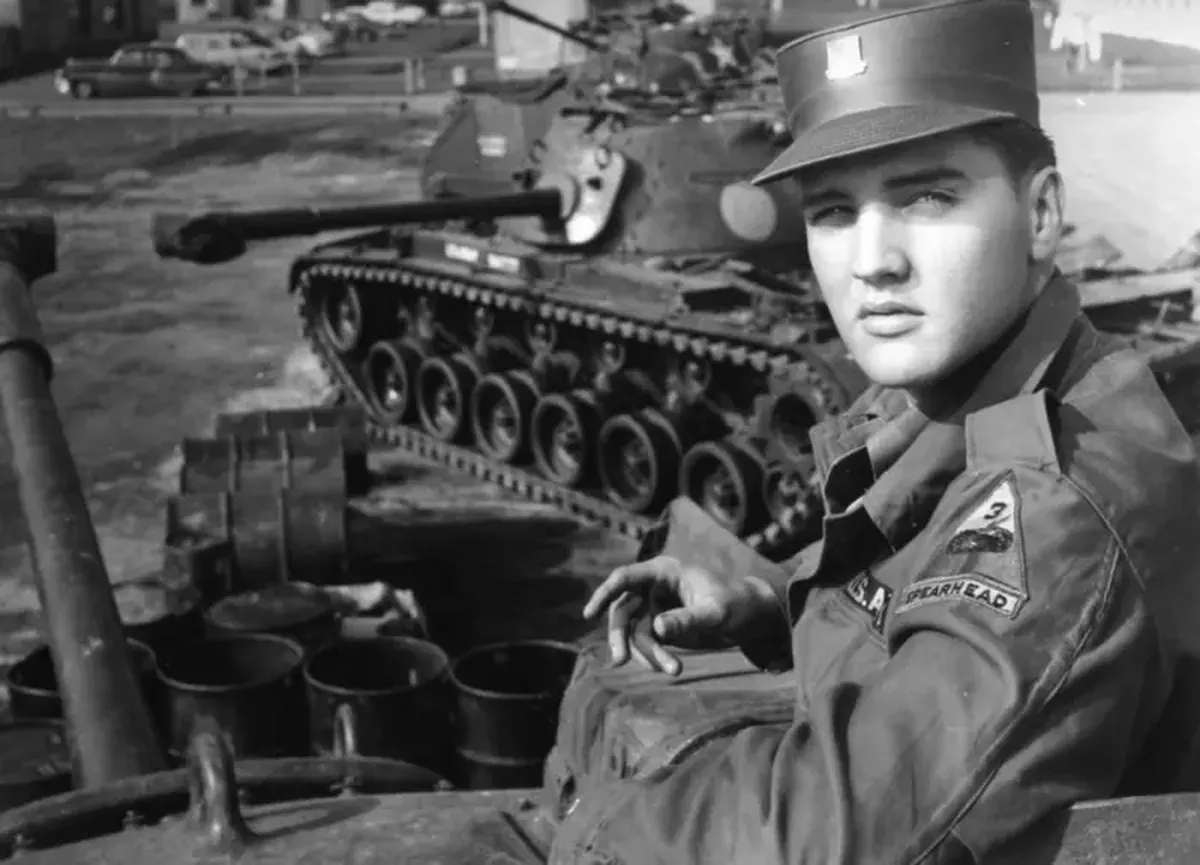
The military was eager to use the young star for promoting military service. In interviews, the striking young American (Elvis Presley’s height was listed as 6 feet in army documents) enthusiastically spoke about his desire to be a soldier, but deep down, he couldn’t help but worry about the potential collapse of his career, which had started so brilliantly. He never performed as a singer while in the army. The news of his mother’s poor health further drained his spirit. Gladys’s death left a heavy mark on Presley, as her premature passing was attributed to her worries about her son. Despite Elvis calling his mother nearly every night, she couldn’t cope with the need to let him go into a “dangerous world.” She was troubled by his rapid rise, his new surroundings, concert tours, and now military service far from home. Her anxiety led her to consume alcohol and amphetamines, which hastened her death at the age of 46 from a heart attack and severe liver damage.
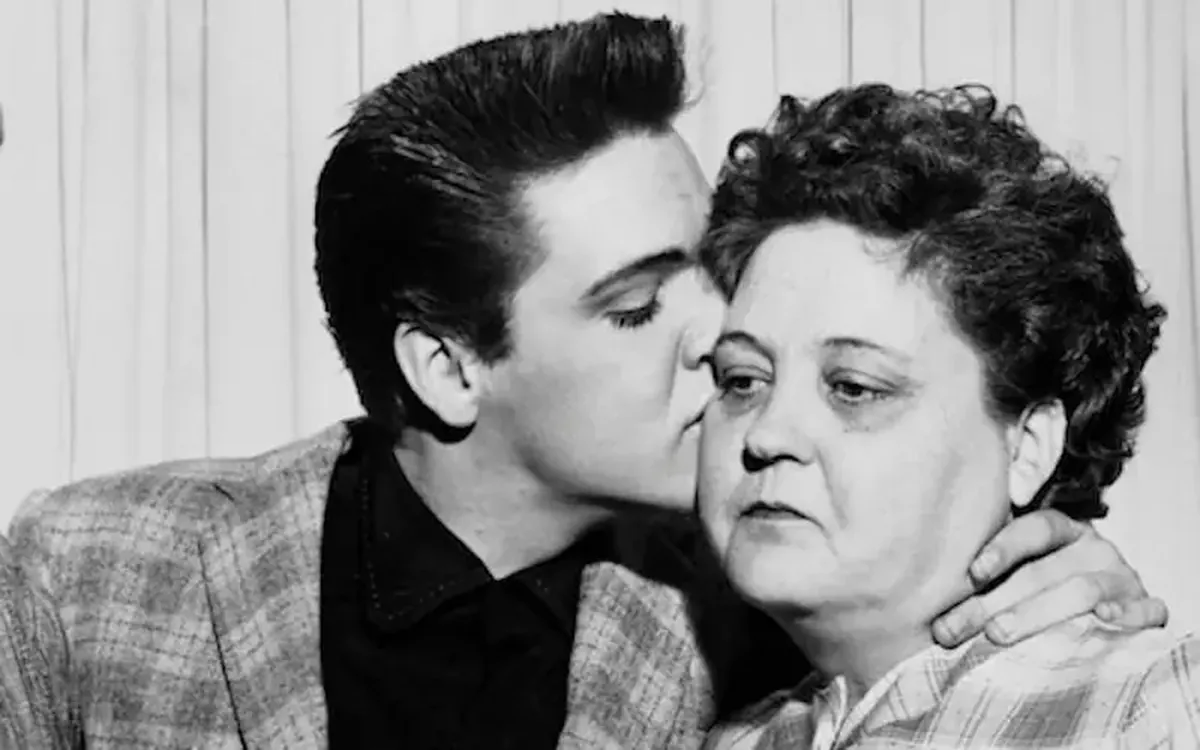
Upon returning to Memphis, Elvis was inconsolable. The 23-year-old soldier said goodbye to his mother in their childhood “bird language,” hugging Gladys as he had when he was little and pleading with her not to leave him. After her death, he lost his anchor, repeating her path in the sense that he too became dependent on pills. Elvis’s ex-wife and the mother of his daughter Lisa Marie, Priscilla Presley, whom he met during his service in Germany (she was the daughter of a U.S. Air Force officer), told the press in 2018 that during night maneuvers and guard duty, Elvis used performance-enhancing drugs. “They were given to soldiers to keep them awake,” Priscilla told People magazine. “And during some performances, energy pills alternated with sleeping pills. He was in uncharted territory, trying to tackle the problem alone.”
From the Tank to Hollywood
Presley served in the 3rd Armored Division, stationed in Friedberg, West Germany. Elvis was allowed to live in a rented house in Bad Nauheim, where his father, relatives, and friends moved in to act as concert managers, accompanists, bodyguards, and staff (the star’s army entourage was dubbed the “Memphis Mafia” by some). During his military service, Presley released four long-playing records. After being discharged as a sergeant, he continued recording new material. The 1960 album “Elvis Is Back” is considered one of Elvis Presley’s best works, and the singles “Stuck on You,” “It’s Now or Never,” and “Are You Lonesome Tonight” topped the charts. His television duet with Sinatra caused fainting among fans, but apart from a few charity concerts in 1961, Presley did not perform again until 1969.
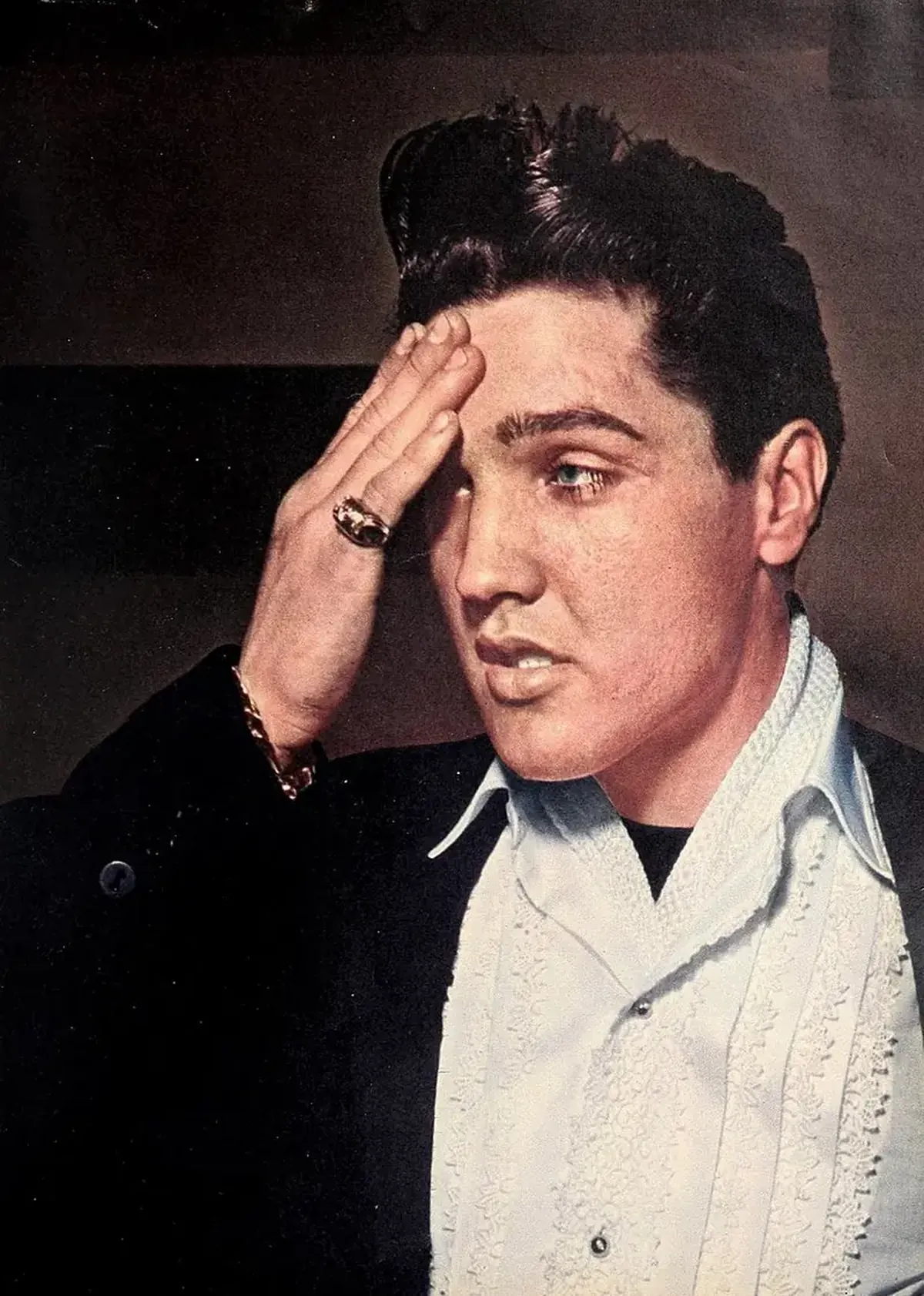
Focusing on his film career, Presley moved to Los Angeles, but the similar roles he found in Hollywood did not meet expectations. Only the first musical comedy, “G.I. Blues,” which revolved around the theme of the artist’s own service in Germany, received unequivocally positive reviews. The soundtrack to the film also topped the charts and was nominated for two Grammy Awards. Only a departure from the musical comedy format in the 1961 film “Blue Hawaii” brought the performer well-deserved satisfaction after the lukewarm reception of several interim films. The movie, in which Presley performed 14 new songs, including hits like “Blue Hawaii” (nominated for a Grammy) and “Can’t Help Falling in Love,” became one of the box office leaders of 1961-62.
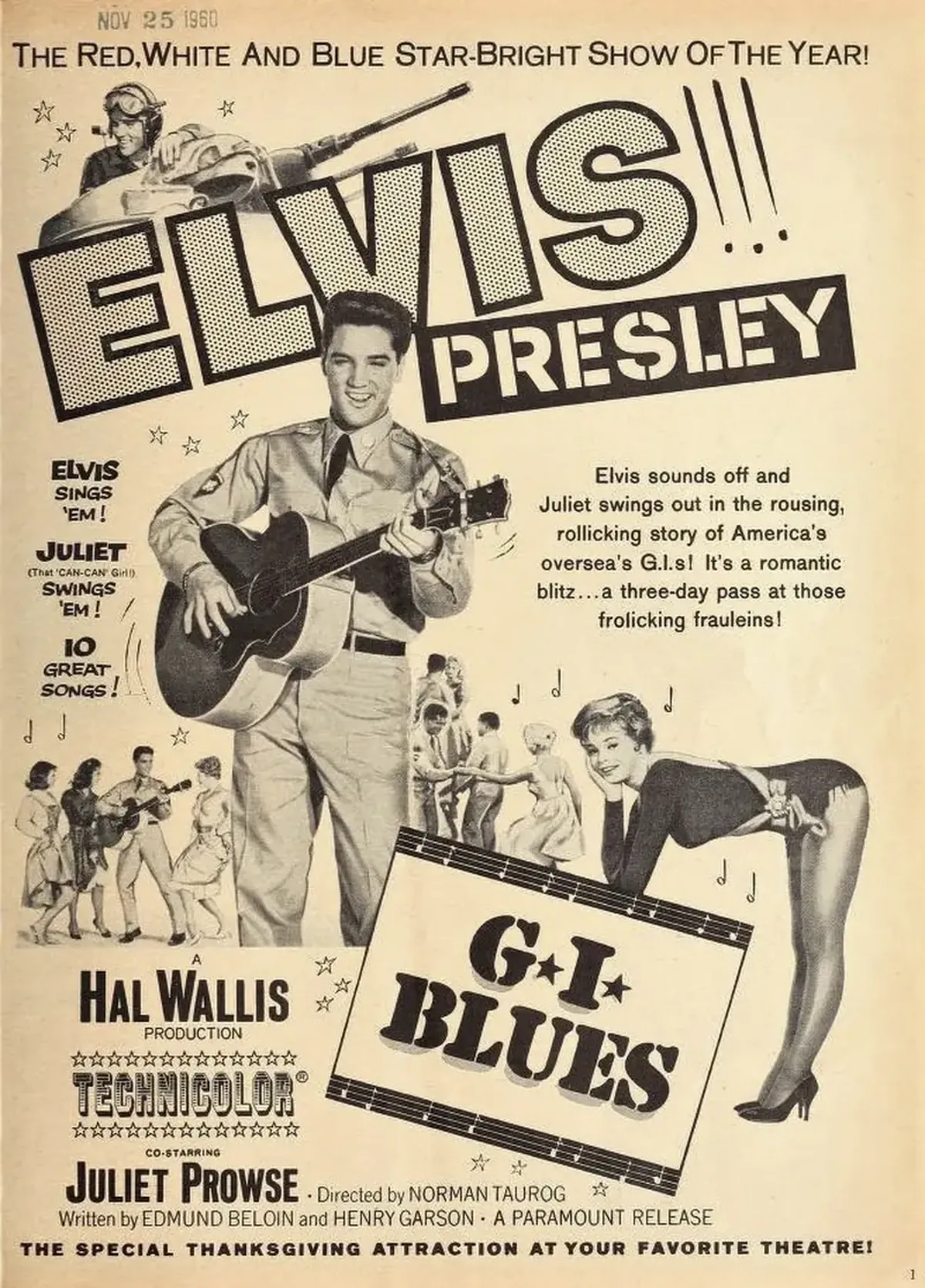
Poster for the film “G.I. Blues,” 1960
Under his contract with Metro-Goldwyn-Mayer, Presley received $500,000 per film, which today amounts to about $4 million, as well as half of the box office revenue (and from Paramount Pictures, the artist received $175,000 per film). Presley’s productivity under the demanding manager broke all conceivable records: he starred in three films a year. The conveyor belt of formulaic films and similar soundtracks led to audience saturation: the 1967 album “Clambake” saw the lowest sales. The stagnation of Presley’s music against the backdrop of the “British Invasion” initiated by The Beatles called for new approaches. Simultaneously, in two projects in 1969, Elvis Presley’s film career came to an end.
A New Image
The artist himself grew so tired of the projects of that time that he decided to return to the stage with a program that had nothing to do with the themes of his films. Instead of the traditional Christmas composition typical for New Year’s performances, the new television concert concluded with an atypical call for social justice in the song “If I Can Dream” from 1968. The audience ratings deemed the “Elvis” show the most popular television project of the season, leading to a further renewal of the performer’s musical style and image. New recordings in 1969 in Memphis, blending country, pop, and rhythm and blues, were highly praised by critics. At that time, Presley also signed a contract for engagements in Las Vegas: performances at the newly established International Hotel (renamed Las Vegas Hilton two years later) were valued at an unprecedented $500,000.
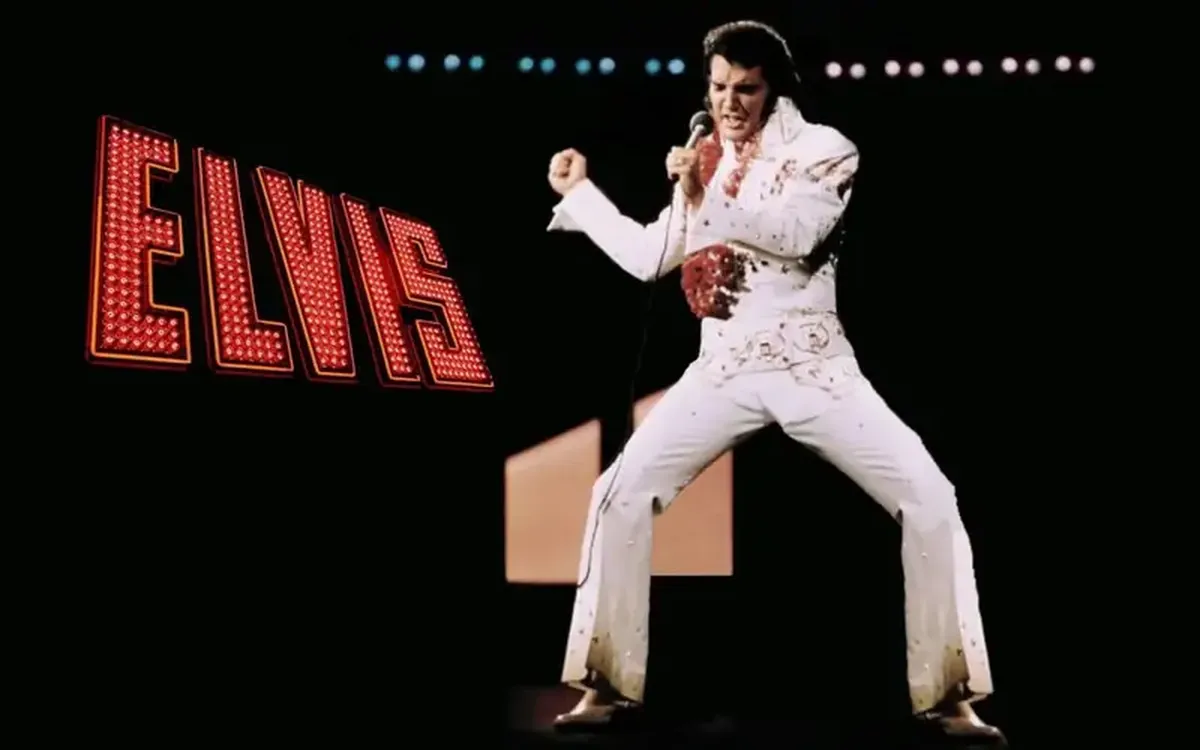
The “Elvis” Show
Elvis Presley consciously distanced himself from the old rock and roll, despite its return to the musical fashion of the time. In just four weeks, he gave 58 concerts, performing twice a day. Over 130,000 attendees set a record for concert venues in Las Vegas. This success compelled the singer to fully transition to concert activity: a five-year contract for performances was signed with the hotel. In 1970, he appeared before the public in a white flared jumpsuit with a bright buckle and macramé embellishments, and with each new performance, the design of his stage costume became increasingly elaborate. Presley took the stage adorned with metal, rhinestones, and precious stones, and his concerts, as observed by witnesses, transformed into a series of ceremonies and rituals. As soon as he finished the last lines, the artist hurriedly left the stage to the sound of drums, while the emcee announced that “Elvis has left the building.”
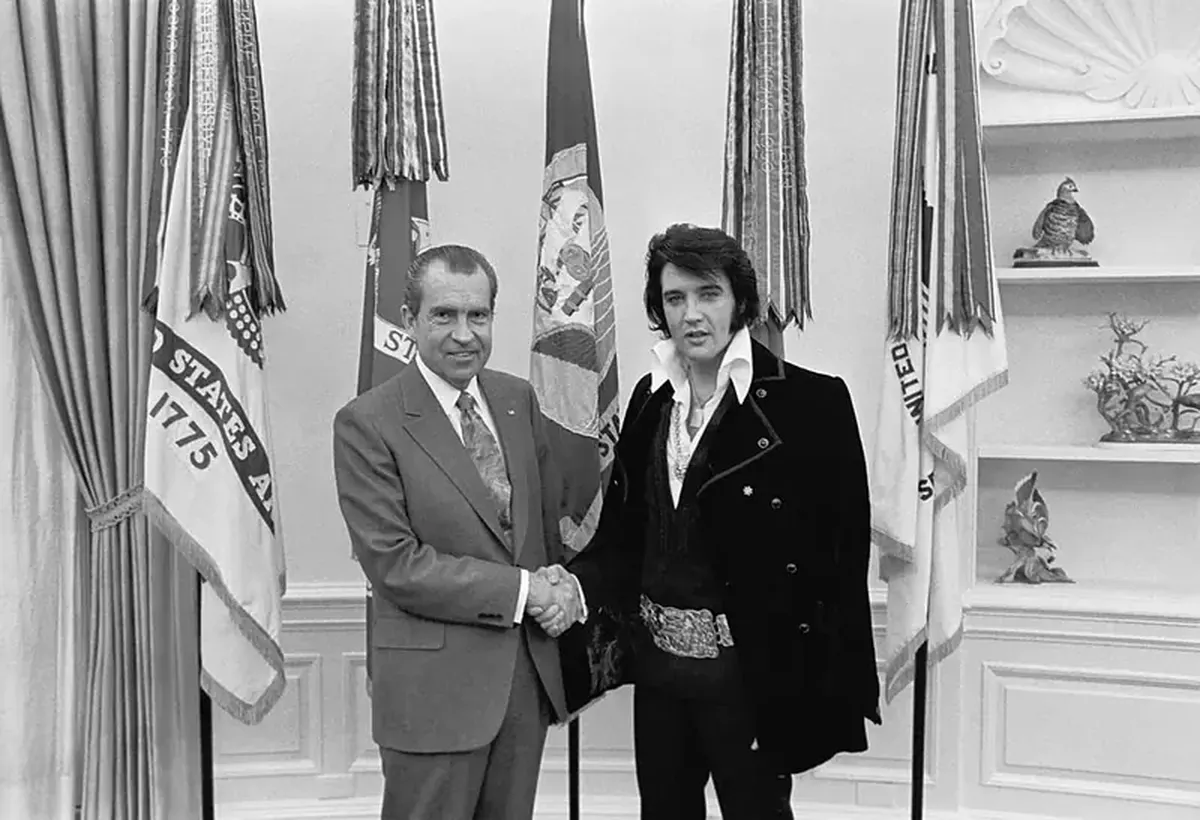
U.S. President Richard Nixon and Elvis Presley
However, even these engagements soon began to bore the singer. After a meeting at the White House with President Richard Nixon at the end of 1970, Elvis Presley received an honorary title as an officer in the fight against drugs. This was paradoxical, as the singer himself did not shy away from this vice. Although the medications prescribed by his doctor were not considered a vice by the artist himself – the prescribed pills helped him maintain his productivity amid such a heavy workload. Between 1969 and 1977, he gave about 1,100 concerts in the U.S. During subsequent studio sessions, Presley recorded 44 new compositions and released his third religious compilation (He Touched Me) in 1973, which won a Grammy for Best Gospel Album. His first global satellite broadcast show aired in 1973 in 38 countries, and the fee of $900,000 and all ticket sales profits were donated by Elvis Presley to a cancer charity.

“What Happened, Elvis?”
Meanwhile, the singer often overlooked his own health issues, suffering from a dependency on medications. In 1970, Elvis was diagnosed with glaucoma in both eyes, which forced him to wear dark glasses, and his list of ailments included chronic hepatitis, diabetes, stomach ulcers, gastrointestinal bleeding, hypertension, pulmonary insufficiency, and back pain. When he could not get out of bed, he agreed to hospitalization and detoxification. But upon returning to the grind of work, Elvis forgot about the need to stick to a diet and would indulge in calorie-laden steaks and fried sandwiches with bacon, banana, and peanut butter (the so-called “Elvis sandwiches”), to which he had been addicted since his youth.
Unable to break free from his food addiction, Presley even asked doctors to induce a drug coma to keep him away from unhealthy food for at least some time. Elvis’s rapid rise from poverty to wealth and fame by the 1970s seemed to embody the “American Dream,” but in his final years, due to significant weight gain and lethargy during performances, the sex symbol remembered from early career photos was nowhere to be found.
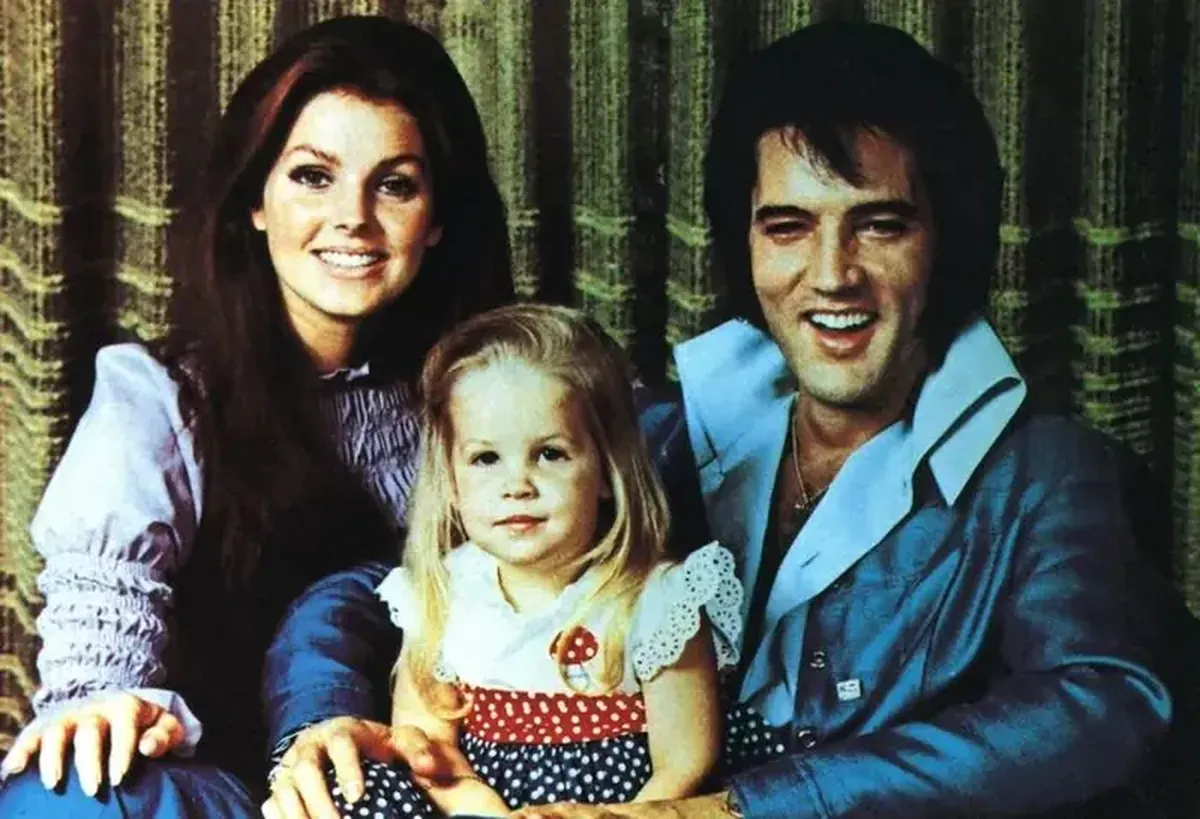
Elvis with his wife and daughter
He also failed to maintain his own family. The reasons for Elvis Presley’s divorce were apparent to anyone who observed his lifestyle. The cooling of marital relations after the birth of their daughter led to mutual infidelities. His wife’s brief affair with a dance school owner turned into a romance with karate instructor Mike Stone, and in 1972, she informed Elvis that she was leaving him for another man. The frequent changes of starlets with whom the divorced singer appeared in public led people to doubt that these women meant anything to him. His last girlfriend was considered by his father and friends to be “the worst of his companions,” reproaching her for not accompanying Elvis on tours and refusing to spend the night with him under the same roof.
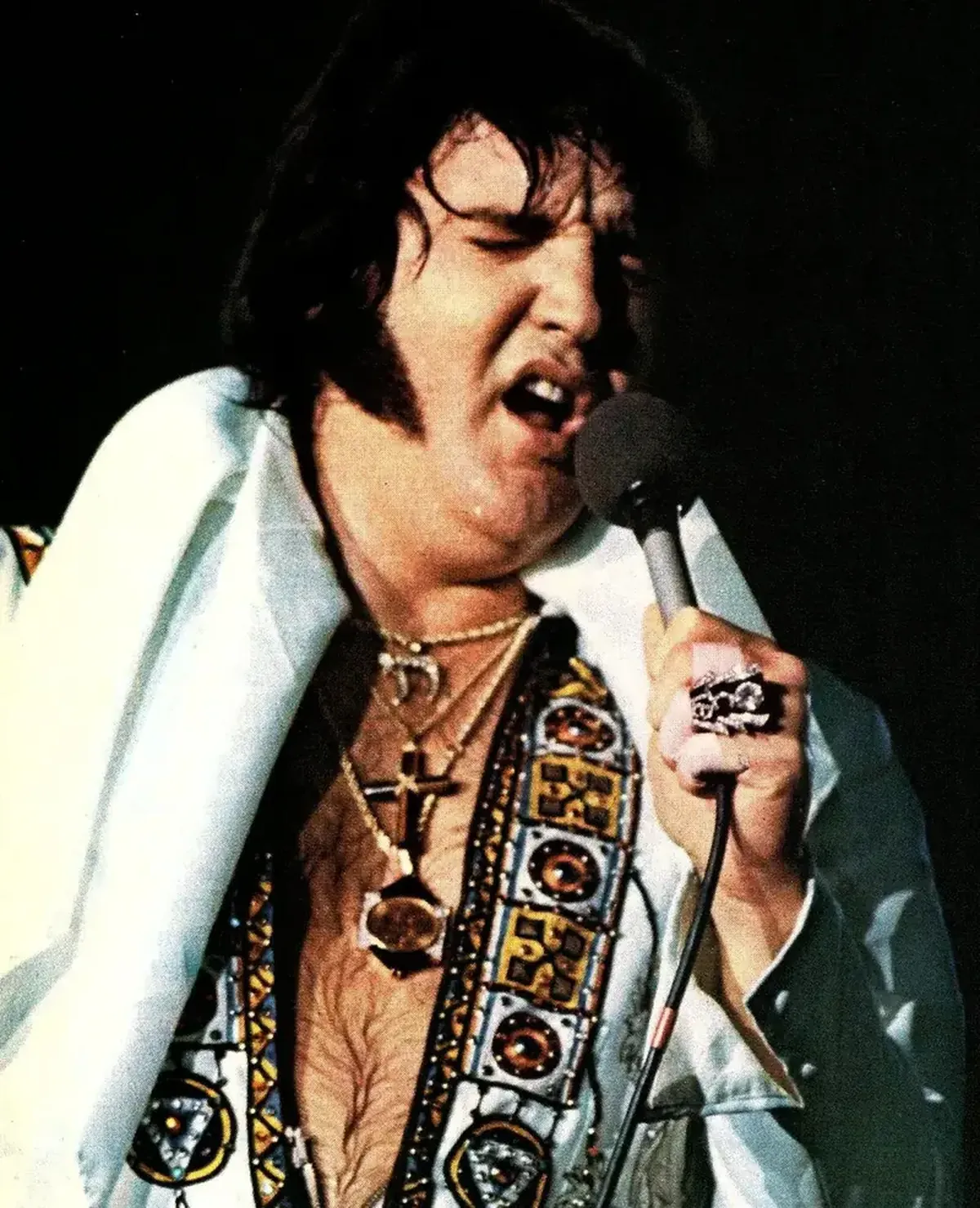
One of the last photos of Elvis
Presley slept in the cold (the air conditioner in the bedroom was running at full blast) and woke up in the afternoon, as he only fell asleep in the morning. Between concerts, Presley spent his time at home reading books on spiritualism and indulging in his usual gluttony. By the age of 42, the age at which Elvis Presley passed away, his weight had reached about 350 pounds – half again as much as it had been ten years prior. In 1975, he even stopped bathing, resulting in sores appearing on his body. The rooms of the house and hotels where the singer stayed were shrouded in semi-darkness. There were surveillance cameras everywhere and a constant connection with security. His former bodyguards, Red and Sonny West, took revenge on the singer for losing their well-paid jobs by publishing a book titled “What Happened, Elvis?” which revealed unpleasant secrets of the star’s daily life. This shocked fans and the “King of Rock and Roll” himself. Presley fell into a depression due to the betrayal of childhood friends.

Elvis’s mansion, where he spent all his free time in the 1970s
How Did Elvis Die?
In 1977, the personal doctor prescribed the artist nearly two hundred prescriptions for over 10,000 doses of narcotics, amphetamines, and sedatives. After his death, pathologists found 10 prescription drugs in Presley’s system – painkillers, anti-anxiety medications, and sedatives. The deterioration of his health ultimately led to Elvis Presley’s death on August 16, 1977. After returning home from the dentist well past midnight, he spoke with his girlfriend, Ginger Alden, who had been with him in his last year, and went to bed, having taken two doses of sedatives (the second proved critical). When his girlfriend woke up in the afternoon, she found Elvis lifeless on the bathroom floor. His death was announced two hours later.
The doctor who made a statement before receiving the toxicology results did not officially link Elvis’s heart failure to drug use. He suggested anaphylactic shock from codeine pills prescribed by the dentist (Presley was allergic to that medication). One of the subsequent medical reports indicated that Presley’s heart was enlarged and that his tissues contained 14 drugs, 10 of which were present in significant amounts. Although the court cleared Presley’s personal doctor of criminal liability, his medical license was revoked. The secrecy of the investigation spawned other theories about the cause of death and created a legend that the singer did not actually die but merely faked his death to pursue spiritual matters (alleged photos of Elvis Presley surfaced periodically in the press, claiming to be taken in various parts of the world).
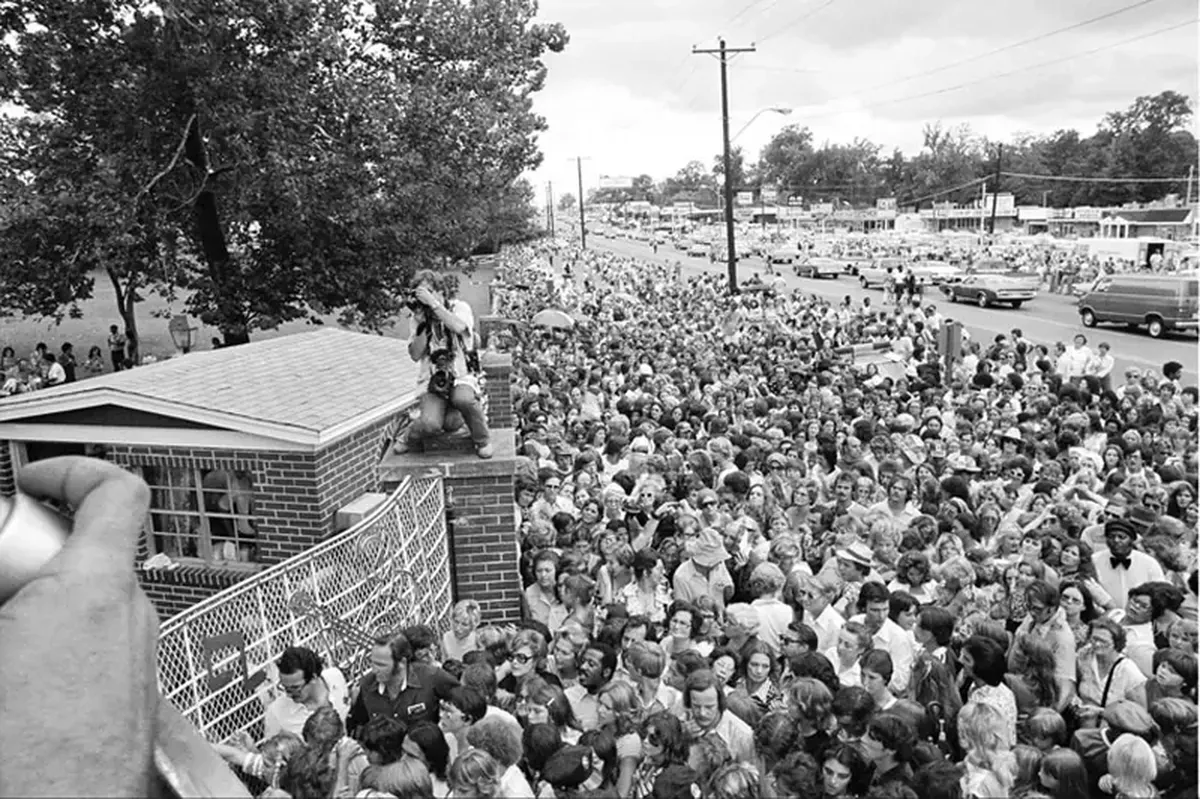
Elvis Presley’s funeral
Due to the unhealthy frenzy surrounding this topic (people attempted to break into the coffin to check if their idol had truly died), the singer’s remains had to be moved from the cemetery to private grounds – Graceland. In 2006, American media published a story about the “secret life” of Elvis Presley, who supposedly lived until the mid-1990s. Since the late 1980s, pseudo-religious organizations have proliferated in the U.S., with programs centered around the worship of Presley and the anticipation of his “second coming.” For fans, Elvis was a “deity” even during his lifetime. A three-time Grammy winner, he became one of the first musicians inducted into the Rock and Roll Hall of Fame – six of his songs were included in the list of “Songs That Shaped Rock and Roll.” Unreleased recordings of the iconic singer continue to emerge, and the number of his records sold has already surpassed one billion.
